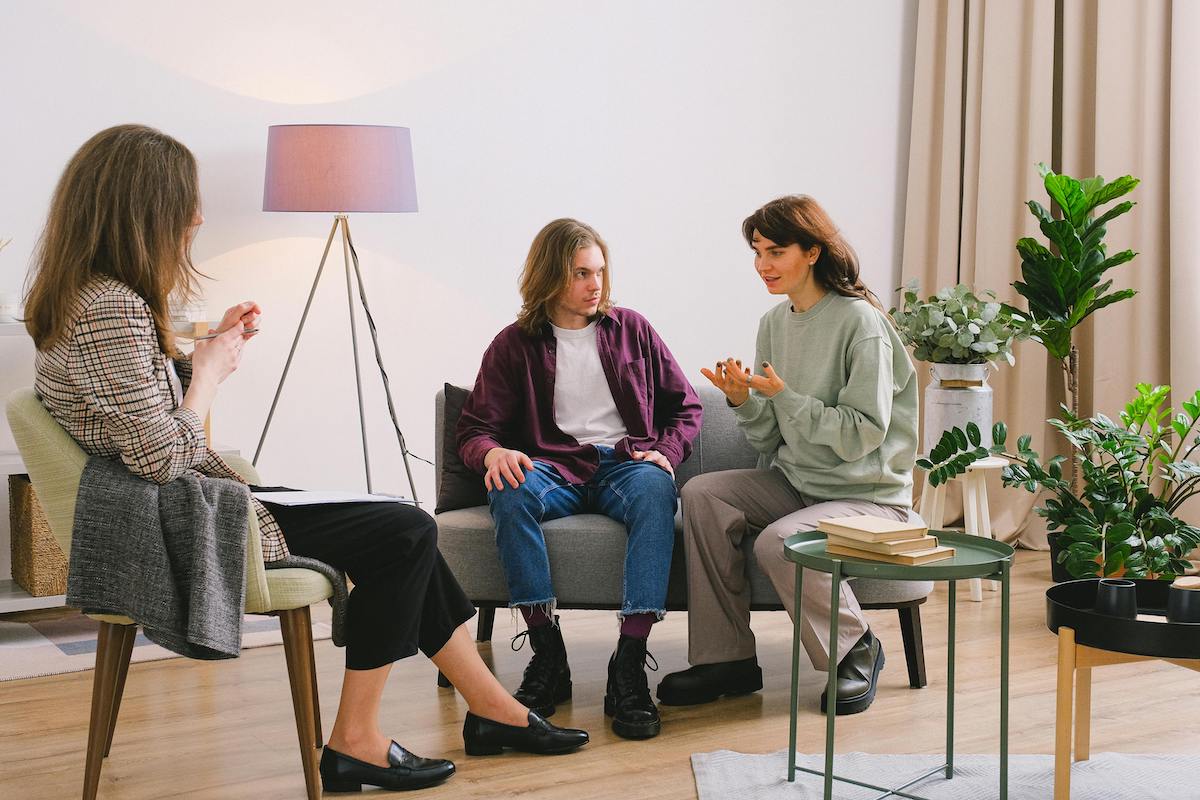If you’re wondering whether couples therapy is really worth it, you’re not alone.
Every relationship faces challenges—conflict, disconnection, or simply growing apart over time. Maybe the connection that once felt effortless now feels like work. Maybe the arguments are getting louder—or quieter. Maybe something just feels…off.
Every relationship hits challenging seasons, but just because these struggles are common doesn’t mean they’re easy to navigate.
I’ve been working with couples for nearly 20 years as a licensed therapist, and I’ve worked with clients at all stages: from couples on the verge of separation to those who simply wanted to feel close again.
The truth is, the benefits of couples counselling go far beyond just “saving” a struggling relationship. Therapy can help you rebuild communication, restore emotional intimacy, and navigate challenges together, even if you’re not in crisis.
Drawing from real clinical experience and research-backed studies, I’ll walk you through what couples therapy can help you make an informed and hopeful choice for your future.

7 Benefits of Couples Therapy
People come to therapy for a myriad of reasons, whether it’s learning to communicate better, overcoming trust issues, or finding strategies for de-escalating arguments before they spiral.
A quality therapist will be able to quickly assess the needs of your relationship and help you find the most effective path forward to a deeper connection.
Here are a few benefits of couples therapy (among many) that I’ve seen my clients experience.
1. Improves Communication Skills
The most immediate benefit of couples therapy is better communication. And it’s more than just “speaking nicer.” A lot of relationship stress doesn’t come from the issue itself, but from how couples handle it when emotions run high.
Improved communication is often the foundation that allows every other aspect of the relationship to shift.
In therapy, couples learn how to interrupt the repetitive conflict loops and stop becoming defensive, shutting down, or spiraling. You’ll practise skills like active listening, reflecting emotions, and speaking from your own experience instead of blaming.
Over time, these skills help you feel more heard, understood, and connected, so that small misunderstandings don’t snowball into something bigger.
2. Helps Rebuild Trust
Trust is one of the most fragile parts of a relationship, and once it is broken, it can feel impossible to get back.
If you’ve had a traumatic event in your relationship, whether that’s an affair, financial deception, or long-standing emotional neglect, couples therapy creates a space where that rebuilding becomes more manageable.
A therapist can guide you in unpacking what happened, how it impacted both partners, and how to start rebuilding with honesty and clear boundaries.
It is not about forgetting or pretending things never happened. It is about creating new patterns that restore safety, transparency, and emotional security over time.
The trust won’t be restored all at once. It comes back in small moments, and one of the major benefits of couples therapy is helping you notice, practise, and let these moments lead to change.
3. Strengthens Emotional Intimacy
Another powerful benefit of couples counselling is helping partners rebuild emotional intimacy.
Over time, stress, conflict, and life changes can create distance between people who once felt deeply connected. You stop sharing your inner world and reaching out for support. Even when you’re in the same room, it can feel like you’re worlds apart.
Therapy provides a space where you can slow down and really hear each other. You’ll learn how to speak vulnerably about your needs, respond to each other with care, and create the kind of emotional safety where intimacy can grow again.
For many couples, this is what makes the difference between simply coexisting and actually feeling loved.
4. Provides Tools for Conflict Resolution
All couples fight, but not all couples know how to fight well.
Without the right tools, conflict becomes a cycle: one partner escalates, the other shuts down, and nothing ever really gets resolved.
Couples therapy helps interrupt that cycle. It gives you both a clear structure for navigating difficult conversations without spiraling. You’ll learn how to stay regulated during tense moments, notice your triggers before reacting, and de-escalate conflict without abandoning the issue.
These skills help you work through disagreements productively. So, instead of sweeping problems under the rug, you can face them together, with more curiosity and less defensiveness.

5. Supports Major Life Transitions
Big life changes can shake even the strongest relationships. Whether you are moving to a new city, welcoming a baby, coping with illness, or adjusting to a career shift, transitions often come with new stresses and unexpected emotions.
During these times, it’s incredibly important to be open to therapy.
A therapist provides structure and support so you can talk openly about fears, expectations, and the new roles you are stepping into.
You’ll learn how to better understand how each of you is coping, where you’re aligned or misaligned, and how to support each other more intentionally during stressful seasons.
6. Helps Clarify Relationship Goals
Not every couple comes to therapy knowing what they want. One person might hope to reconnect, while the other is unsure whether the relationship can be repaired.
A skilled therapist helps you explore these goals without pressure or judgment.
You will be able to reflect on your relationship’s strengths, challenges, and future possibilities. Sometimes that clarity leads to renewed commitment. Other times, it leads to a more thoughtful, respectful separation.
No matter the outcome, the goal is to help both partners find clarity, emotional safety, and a path forward they can feel good about.
7. Encourages Personal Growth and Self-Awareness
One of the most overlooked benefits of couples therapy is how much individual insight it provides. As you examine the patterns in your relationship, you inevitably start learning more about yourself—your triggers, your attachment style, your conflict habits, and your emotional needs.
This self-awareness doesn’t just make you a better partner—it makes you a more grounded, emotionally intelligent person.
And that growth often ripples out into every area of your life.
For many clients, this inner work becomes one of the most valuable outcomes of the entire process.
Does Couples Therapy Really Work?
Yes, couples therapy is one of the most effective tools for improving relationships. And there’s research to back it up.
Studies show that the average couple who participates in therapy is better off than 70–80% of couples who don’t get help at all.
Similarly, the American Association for Marriage and Family Therapy reports that over 90% of couples feel better equipped to handle future challenges after attending sessions.

Of course, therapy doesn’t guarantee that every couple stays together, but it does offer clarity, structure, and the tools to move forward.
It’s important to note that effectiveness depends on the therapist and the client(s). Even with the world’s best therapist, the client still has to show up with consistency, honesty, and a willingness to do the work.
If both partners show up with intention and the right expectations, couples therapy can be transformative and deeply healing.
Ready to Invest In Your Relationship?
The benefits of couples therapy are real, peer-reviewed, and they go far beyond learning how to stop fighting. Therapy can help you rebuild trust, navigate transitions, deepen emotional intimacy, and clarify whether your relationship can truly support who you’re becoming.
I’ve met very few couples who ever regret starting therapy.
More often than not, they regret waiting so long to start.
That’s because therapy doesn’t just offer tools. It offers perspective. It helps you understand your dynamic with more compassion and identify what’s been keeping you stuck.
You don’t have to be in crisis. If something in your relationship feels off—or even if you just want to strengthen what’s already working—it’s worth exploring what therapy can offer.
Take the first step toward a more connected, resilient, and fulfilling relationship.
SCHEDULE A FREE 20-MINUTE CONSULTATION CALL TODAY